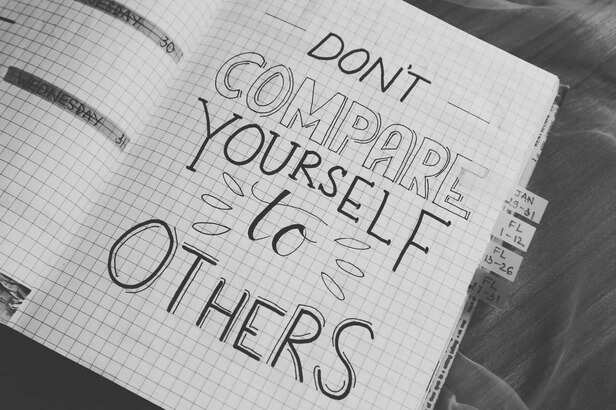Comparison Is the Thief of Happiness - Gita on Envy and Ego
Riya Kumari | Jun 23, 2025, 12:40 IST
It’s 11:43 PM. I’m wrapped in a blanket burrito, clutching my phone like it’s the last slice of pizza. I open Instagram "just to check one thing," and suddenly I'm ten stories deep into my ex’s new girlfriend’s vacation in Bali. She looks like she was airbrushed into existence, and I—well, I have crumbs in my hair. Somewhere between her seventh waterfall reel and my own emotional spiral, I hear it: that whispery, smug little voice that says, “Look at her life. Look at you.”
We don’t always realize we’re doing it. It begins as a glance. A scroll. A casual conversation. A “good for her” that quietly turns into “what about me?” Suddenly, you’re not looking at someone’s success—you’re measuring your own failure. This is how comparison works. It doesn’t arrive like a storm; it seeps in like fog. Quiet. Constant. And before we know it, we’re living our lives not by what matters, but by what others have. The Bhagavad Gita calls this out—not gently, but truthfully. Envy is not a personality quirk. It is rooted in ego, and ego is rooted in forgetting who we are. And that forgetting? That’s what truly makes us suffer.
Ego Wants Recognition. The Soul Wants Meaning

The Gita teaches that we are not the body, not the mind, not even our roles. We are atma—the soul. But the ego, that voice in us that craves validation and fears irrelevance, doesn’t want to hear that. It wants proof. It wants comparison, because comparison gives it a scoreboard. The moment we measure ourselves against someone else, we’ve already left our true path.
That path, Krishna says, is dharma—our unique duty, our soul’s work in this lifetime. And no matter how dazzling someone else's life looks, their dharma cannot fulfill you. It wasn’t made for you. It’s like trying to grow a tree using someone else’s roots. You might mimic the shape, but it will never be alive.
The Ache Behind Envy

Envy isn’t really about them. It’s about the parts of ourselves we’ve abandoned. When you feel envy, ask: What am I neglecting in me? It may be a longing to create. To rest. To be seen honestly, not performatively. But instead of honoring that, we compare—and comparison makes us smaller. It takes a very real need for self-connection and redirects it into resentment. And resentment, if left unchecked, becomes bitterness.
Krishna doesn’t shame Arjuna for his emotional confusion. He doesn’t say, “Don’t feel this.” He says, “See clearly.”
Because clarity is the beginning of freedom.
Your Dharma Cannot Be Compared

One of the most profound verses in the Gita says:
“Better to fail in your own dharma than succeed in another’s.”
That line alone is enough to change a life. Because success that isn't aligned with who you truly are will never feel like peace. It might look good. It might impress people. But it will leave you empty. And the tragedy isn’t that we don’t succeed. The tragedy is when we succeed at becoming someone we never truly wanted to be.
The Gita reminds us: Dharma is not about ambition. It’s about alignment. When you’re aligned, you’re not competing. You’re not chasing. You’re not proving. You’re simply walking—step by step—toward something deeply yours.
Return to Yourself

We lose ourselves slowly, in fragments: In comparison. In ego. In performance. But we come back the same way. In honesty. In clarity. In courage. Comparison can feel natural, even inevitable. But it isn’t truth. The truth is, the only life you are meant to live is your own. Not hers. Not his. Not their filtered version of success. So when envy rises, don’t suppress it. Listen to it.
Let it show you where you’ve gone silent in your own life. Let it teach you what needs love, not judgment. And then, gently, return. To your work. Your path. Your peace.
One Final Thought
When the Gita says, “You have the right to your action, but not to the fruits of your action,” it’s not asking you to give up desire. It’s asking you to free yourself from the need to be better than. To let go of the scoreboard. The Gita doesn’t promise us a spotlight. It promises us clarity.
And in that clarity, we realize: Peace isn’t found in being more. It’s found in being whole. So take a breath. Unfollow the noise. And quietly—but fully—choose to belong to yourself again.
Ego Wants Recognition. The Soul Wants Meaning

Compare
( Image credit : Pexels )
The Gita teaches that we are not the body, not the mind, not even our roles. We are atma—the soul. But the ego, that voice in us that craves validation and fears irrelevance, doesn’t want to hear that. It wants proof. It wants comparison, because comparison gives it a scoreboard. The moment we measure ourselves against someone else, we’ve already left our true path.
That path, Krishna says, is dharma—our unique duty, our soul’s work in this lifetime. And no matter how dazzling someone else's life looks, their dharma cannot fulfill you. It wasn’t made for you. It’s like trying to grow a tree using someone else’s roots. You might mimic the shape, but it will never be alive.
The Ache Behind Envy

Stage
( Image credit : Pexels )
Envy isn’t really about them. It’s about the parts of ourselves we’ve abandoned. When you feel envy, ask: What am I neglecting in me? It may be a longing to create. To rest. To be seen honestly, not performatively. But instead of honoring that, we compare—and comparison makes us smaller. It takes a very real need for self-connection and redirects it into resentment. And resentment, if left unchecked, becomes bitterness.
Krishna doesn’t shame Arjuna for his emotional confusion. He doesn’t say, “Don’t feel this.” He says, “See clearly.”
Because clarity is the beginning of freedom.
Your Dharma Cannot Be Compared

Self Hug
( Image credit : Pexels )
One of the most profound verses in the Gita says:
“Better to fail in your own dharma than succeed in another’s.”
That line alone is enough to change a life. Because success that isn't aligned with who you truly are will never feel like peace. It might look good. It might impress people. But it will leave you empty. And the tragedy isn’t that we don’t succeed. The tragedy is when we succeed at becoming someone we never truly wanted to be.
The Gita reminds us: Dharma is not about ambition. It’s about alignment. When you’re aligned, you’re not competing. You’re not chasing. You’re not proving. You’re simply walking—step by step—toward something deeply yours.
Return to Yourself

Boundary
( Image credit : Pexels )
We lose ourselves slowly, in fragments: In comparison. In ego. In performance. But we come back the same way. In honesty. In clarity. In courage. Comparison can feel natural, even inevitable. But it isn’t truth. The truth is, the only life you are meant to live is your own. Not hers. Not his. Not their filtered version of success. So when envy rises, don’t suppress it. Listen to it.
Let it show you where you’ve gone silent in your own life. Let it teach you what needs love, not judgment. And then, gently, return. To your work. Your path. Your peace.
One Final Thought
And in that clarity, we realize: Peace isn’t found in being more. It’s found in being whole. So take a breath. Unfollow the noise. And quietly—but fully—choose to belong to yourself again.
